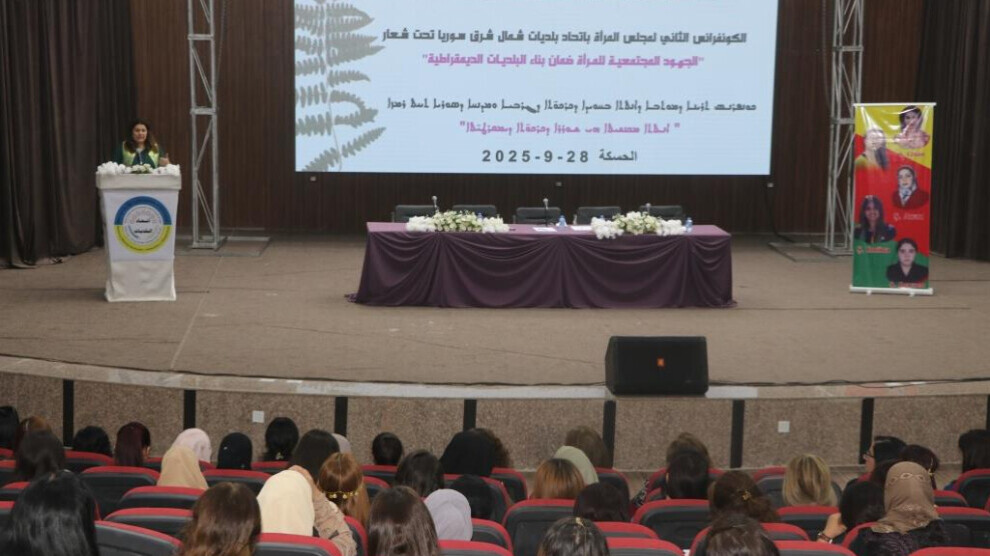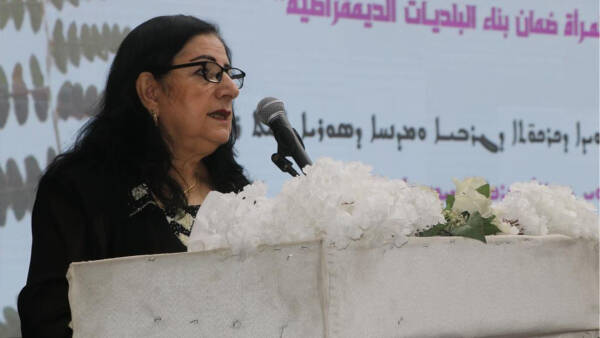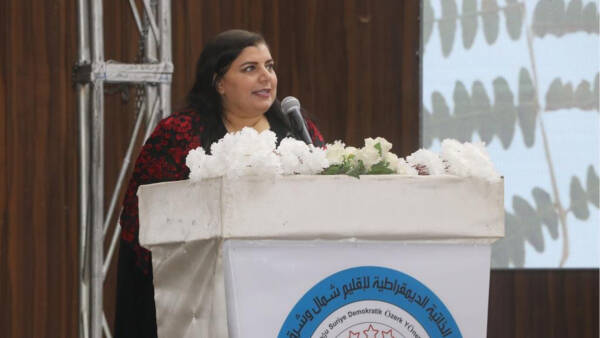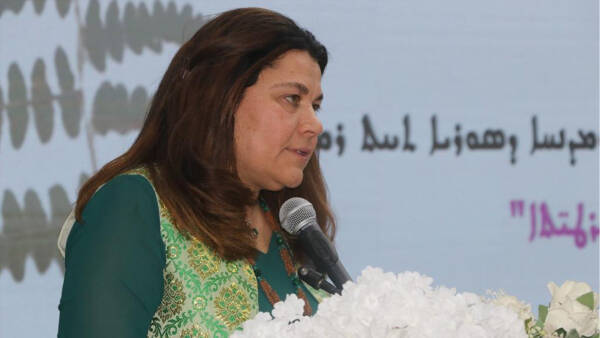The Women’s Assembly of the Northern and Eastern Syria Municipalities Union convened at its regular conference
At the 2nd Conference of the Women's Council of the Union of Municipalities of North and East Syria, the role of women in municipalities was emphasized, saying, "Women are not only half of society; they are also the heart, mind and pioneer of change."

Hasaka – The 2nd Northern and Eastern Syria Municipalities Union Women’s Assembly Conference kicked off in the city of Hesekê, Northern and Eastern Syria. The conference, held under the motto “Women’s Social Efforts are the Guarantee of Building Democratic Municipalities,” brought together more than 200 women from municipalities, the Autonomous Administration, political parties, and women’s organizations.

Co-chair of the Peoples’ Assembly of the Autonomous Administration of Northern and Eastern Syria, Siham Qeryo, highlighted the importance of the conference in her opening remarks: “This conference is not an ordinary administrative meeting; it is a historic turning point mobilizing the women’s struggle for justice, equality, and active participation in social governance. For years, women in Northern and Eastern Syria have proven themselves through their resistance and their work. Women have not only defended the land and identity; they have also shown the power to run institutions, produce politics, and present a pioneering model in local governance.”
Siham Qeryo drew attention to the fact that municipalities are the institutions closest to the people, and continued: “Municipalities are the liveliest spaces where democracy takes shape. The voices of women must reach every neighborhood, village, and city. Women’s presence in municipalities is not a luxury, but a national necessity. It is the fundamental tool for building a pluralistic, just, and solidaristic society.”
Finally, addressing the women, Siham Qeryo said: “This conference is a call for women to think collectively, to create a common vision, and to raise their will. Women are not just half of society; they are its heart, mind, and conscience. Women must also be at the forefront of decision-making mechanisms.”
‘In Northern and Eastern Syria, women are organized and hold willpower’

Berivan Xalid, member of the Kongra Star Coordination, said in her speech: “Today we are going through a very critical period in the history of Syria. At such a time, this conference is a strong message that demonstrates the power and determination of women. This message is directed at all international forces and authoritarian structures: In Northern and Eastern Syria, women are organized, they have willpower, and they possess decision-making power.”
She emphasized that women in the region have carried out a revolution not only in the military field but also institutionally, stating: “Women became the pioneers of the revolution. Not only on the frontlines, but also in institutions directly touching society, such as municipalities, they have proven themselves. Today, with the co-chair system, all our cities and towns have attained a democratic governance model. This is an experience unprecedented anywhere in the world.”
Berivan Xalid added: “We believe that with the same will and the same system, women will also be pioneers in building a pluralistic and decentralized democratic Syria. Women’s power will be the foundation of the new Syria.”
Foza Yusif: International powers have become parties to the processes of change in Syria

Foza Yusif, member of the Presidential Council of the PYD, addressed the general political landscape in the Middle East and Syria’s place within it. She said:
“Turkey, Iran, Israel, and other regional powers are competing to incorporate the Middle East into their spheres of influence. The same applies to Syria. This competition essentially revolves around economic interests, trade routes, and control of land and sea transport corridors. For this reason, Syria is constantly kept in a state of instability.”
She noted that the developments in Syria over the past nine months were also part of this great power struggle: “All international powers, including Russia, Britain, the U.S., and even Israel, have become parties to the processes of change in Syria. Now they are in a state of rivalry and conflict with each other.”
Highlighting the dangers this poses for the Syrian people, she said: “All these states are ready to sacrifice Syria and its people for their own interests. None of today’s agreements or ongoing negotiations include the will of the Syrian people. These are secret bargains, not in the interest of the people of Syria, but rather meant to deepen the crises.”
“All these attacks are aimed at deepening the crisis in Syria”
She pointed out that the massacres in the coastal region and in Sweida were also results of these policies, saying: Foza Yusif also touched on the social divisions and the influence of radical groups created by international policies: “The policies of international powers and the jihadist mentalities such as Hay’at Tahrir al-Sham have fueled social polarization and hate speech. In response, a common stance must be taken against the language of hate. All provocative media tools must be curbed. What we need is a national discourse that strengthens dialogue among Syrians, far from hate and hostility. The discourse of peace and fraternity reflects the real demands of the Syrian people.”
‘The centralized system is a great danger’
Foza Yusif emphasized that a centralized system poses a great danger for Syria, continuing: “A centralized administration is like a time bomb that brings Syria to the point of fragmentation. What must be built instead is a democratic, pluralistic, and decentralized system that represents the identities of all peoples.”
She placed particular emphasis on the role of women, stressing that their leadership was critical in building a new Syria: “The will of women must be guaranteed, and their rights secured. Building democratic municipalities under the leadership of women can be a model for all of Syria. Women are not just half of society; they are its heart, conscience, and mind. Therefore, without women’s representation, a new Syria cannot be built.”
Drawing attention also to Turkey’s policies, she said: “Turkey seeks to manage and deepen the Syrian crisis for its own interests. Its threats obstruct the search for solutions. Therefore, as a society, we must be aware of these policies and remain alert to the poison spread by hate speech. Because this discourse can tear apart the social fabric of Syria and drag it into civil war.”
